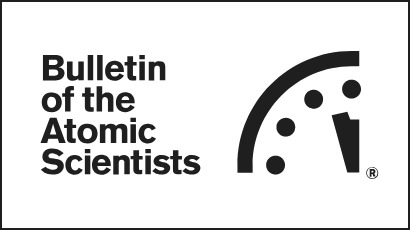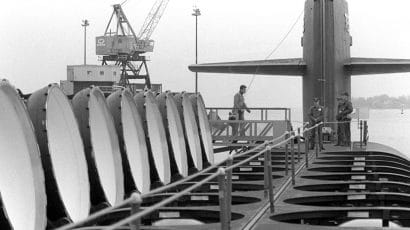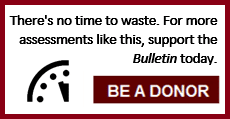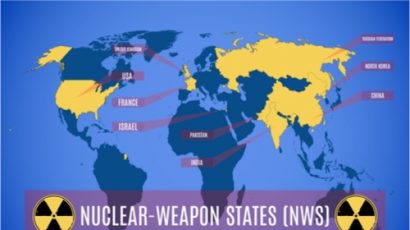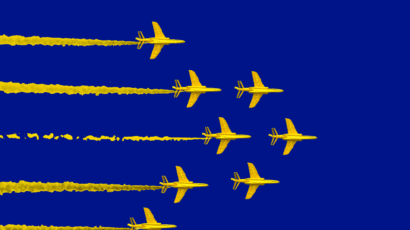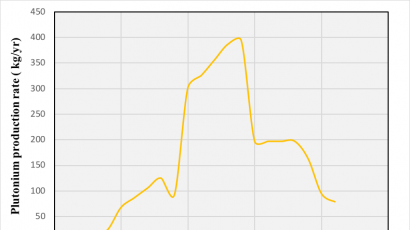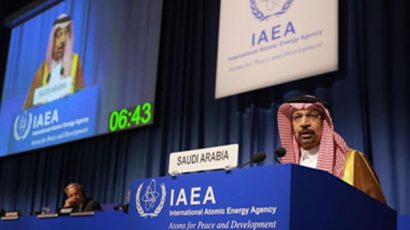Search results for
In recent years, many foreign affairs experts have attempted to demonstrate the linkages between climate change and the social tensions that can lead to conflict. While critics may believe this is simply a fad in international affairs, history suggests otherwise. Over the last few millennia, climate change has been a factor in conflict and social collapse around the world. The changing climate has influenced how and where people migrate, affected group power relations, and provided new resources to societies while taking away others.
Declaring a no-first-use nuclear policy would be exceedingly risky
With Russia and China advancing on their neighbors, now is not the time for a US promise never to launch a first nuclear strike.
The Arctic as a bridge
No country owns the North Pole or the expanse of the Arctic Ocean surrounding it. The Arctic region has a population of about 4 million, including more than 30 distinct groups of indigenous people using dozens of languages; they have lived there for more than 10,000 years. The area also has a unique and diverse ecosystem that includes fish, marine mammals, birds, land animals, and a thriving web of bacteria, viruses, algae, worms, and crustaceans that live in sea ice.
Why, in nuclear weapons policy, sometimes fewer options are better
Proponents say the new low-yield warhead adds flexibility and closes an “exploitable gap” in US capabilities. In reality, it’s a half-measure that only confirms a US reluctance to commit resources.
The human causes of viral outbreaks like Zika
As another mosquito-borne virus spreads rapidly, we should consider how to prevent the next one.
Improve the nuclear test monitoring system
To assure global coverage and a higher probability of detecting nuclear tests, if the international community must expand its monitoring system and put limits on radioactive releases from nuclear facilities
Your money or your life?
When I moved to a neighborhood known as the "murder capital" of New York City, I figured it was only a matter of time before someone held a knife to my throat and demanded my wallet. I would hand it over, of course. It's only money, right? But it didn't happen like I thought it would. I left a Christmas party late one night and heard someone running behind me as I approached a subway entrance. When I whirled to look, I was struck with a heavy object. I tumbled down the staircase and scrambled to my feet -- still in possession of 30 cents and two subway tokens.
High camp and soft power: How Eurovision explains modern Europe—and more
By | On May 9, the first semi-final of the 2023 Eurovision Song Contest (ESC) will be broadcast from Liverpool in the United Kingdom. It is one of the largest non-sporting broadcast events in the world, with more than 160 million viewers expected to tune in. While some less familiar viewers may be tempted to … Continued
Why North Korea and Iran get accused of nuclear collusion
Allegations of Iran-North Korea nuclear cooperation pop up repeatedly, but have no basis in fact.
Even in the face of Russian aggression, a nuclear ‘Eurodeterrent’ is still a bad idea
Despite doubts about credibility of NATO or US security guarantees, a European nuclear force would still bring more risks than benefits.
Strong health care equals strong emergency response
In previous columns, I've discussed the consequences that will result during a pandemic or bioterrorist attack from not insuring all Americans and providing adequate primary care--see "The Security Impact of the Uninsured" and "The Exodus of General Medical Physicians." What I haven't discussed is that the U.S.
Reducing the risk of nuclear war begins in the classroom
Most students do not have a strong understanding of what nuclear weapons are, their destructive power, or their role in the international order, and even fewer have a sense of how many nuclear weapons exist.
Why China stopped making fissile material for nukes
China will likely constrain its nuclear expansion if the United States pledges to limit its missile-defense plans.
Inequality is a climate problem
Widespread societal and behavioral changes are necessary to reduce carbon emissions, but global inequality is standing in the way.
Revitalizing high-level nonproliferation and disarmament talks
Unproductive blame shifting has dominated the nuclear debate in recent years, frustrating progress and serving only the interests of those who are content to see no movement on nonproliferation and disarmament. Rekindling a spirit of common purpose on the nuclear agenda is an urgent task.
Despite the post-Cold War decline in public attention, the consequences of nuclear weapons proliferation and an indifferent international performance on nuclear disarmament remain potentially catastrophic.
How to better study—and then improve—today’s corrupted information environment
For the information environment to thrive, investments in data access, standardized measurements, and research tooling are needed.
NATO joins the Pentagon in deeming climate change a threat multiplier
A new NATO special report concludes that climate change will make things worse in the world's most unstable regions.
A third way toward a WMD-free Middle East
An incremental approach could move the region beyond weapons-of-mass-destruction gridlock.
Knowing when to walk: What is the best alternative to a formal US-Saudi nuclear agreement?
Although Washington should keep working to bridge the divide with Riyadh, the United States also needs to begin planning for a scenario in which it is unable to reach an acceptable nuclear cooperation agreement. The key for the United States, in the parlance of negotiating strategy, is to know its BATNA, or “Best Alternative to a Negotiated Agreement.” If the Saudis don’t bend, the United States will have options to safeguard US interests, including, for example, increased US intelligence on Saudi’s nuclear program and clear guidelines for when sanctions might be imposed should the Saudis move toward uranium enrichment.
Watts Bar Unit 2, last old reactor of the 20th century: a cautionary tale
The TVA used to be at the forefront of new technology. Not anymore.
